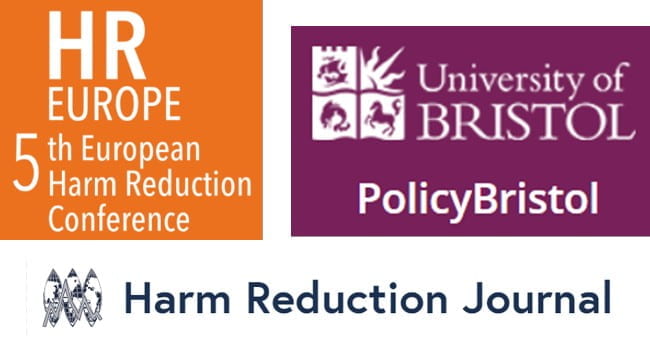Launch of the film – Putting UK Drug Policy into Focus
And discussion with:
Professor David Nutt – Imperial College London
Ann Fordham – International Drug Policy Consortium
Dr Magdalena Harris – London School of Hygiene and Tropical Medicine
Neil Woods – Law Enforcement Action Partnership
Dr Nuno Capaz – Lisbon Dissuasion Commission
Dr Prun Bijral – Change Grow Live
Followed by a Q&A
Chaired by Dr Adam Holland and Dr Emily Crick (University of Bristol)
5th November 2020
15:00 – 16:30 GMT
(16:00 – 17:30 CET)
Register for the free webinar here, along with the other online events of the European Harm Reduction conference


Adam Holland – Associate Researcher, School of Population Health Sciences
The world over, drug-related harm is on the rise, and the global drug market continues to increase in size. If the aim of drug policy is to reduce harm, then it is failing. Any other field of public policy similarly marred by failure would be swiftly overhauled, however many governments persevere with a punitive, criminal justice approach to drug use. This is despite a chorus of voices highlighting the harm it is itself responsible for, its inconsistency with a human rights approach and the disproportionate application of drug laws on members of ethnic minority communities.
The United Kingdom is no exception. The latest figures from the Office for National Statistics demonstrate a sustained increase in the drug related death rate in England and Wales, to the highest level on record. Calls from advisory bodies within the UK government to re-focus drug policy on health and harm reduction have not been acted on. This includes, for example a recommendation from the Home Office Advisory Council for the Misuse of Drugs (ACMD) to allow the opening of drug consumption rooms, and a recommendation from a recent Parliamentary Health and Social Care Committee to consider the decriminalisation of drug possession.
The propagation of punitive policy may be being driven directly by policymakers, or it might be driven indirectly by the electorate as politicians try to avoid appearing “soft on drugs”. This webinar will consider some of the challenges and opportunities faced when engaging with both of these groups to promote a more ethical approach to drug policy. There are various conceptions of what a more ethical approach to drugs might look like. This could include wider provision of harm reduction interventions, regardless of the person’s intention to stop using drugs; the decriminalisation of drug possession, as was instituted by Portugal in 2001; or the responsible regulation of the drug market, as recommended by the Global Commission on Drug Policy, and UK drug-reform charity Transform.
After the launch of the short film – Putting UK drug policy into focus, which explores the problems with UK drug policy as an example of a criminal justice focused approach to drugs, we will hear from a panel with a wealth of experience working with national and international policymakers and directly with the public. This includes Professor David Nutt (former chair of the ACMD and chair of Drug Science), Ann Fordham (Chief Executive of the International Drug Policy Consortium and Chair of the Strategic Advisory Group to the United Nations on Drug Use and HIV), Dr Magdalena Harris (Associate Professor at the London School of Hygiene and Tropical Medicine), Neil Woods (board member of the Law Enforcement Action Partnership and former undercover police officer), Nuno Capaz (Vice-Chair of Lisbon’s Drug Dissuasion Committee) and Dr Prun Bijral (Change Grow Live).
The short film has been produced with the public in mind, however hopefully it will also be of interest to a range of academics, professionals, and policymakers. The contributors to the film listed below include drug policy experts, advocates and current and former police officers, offering a range of perspectives on what is being done wrong in terms of drug policy, and how it could be improved. I can only hope that my non-professional filmmaking efforts have even partially done justice to this inspiring and passionate group – and that the film might make even a few give pause, and reflect.
Professor Alex Stevens – University of Kent
Andria Efthimiou – Mordaunt Trust Advocacy Group
Ann Fordham – International Drug Policy Consortium
Cedric Charvet – International Network of DCRs
Professor David Nutt – Imperial College London
Duncan Stephenson – Royal Society of Public Health
Eberhard Schatz – Correlation European Harm Reduction Network
Dr Jason Horsley – Former Director of Public Health
Detective Chief Inspector Jason Kew
Kirstie Douse – Release
Naomi Burke-Shyne – Harm Reduction International
Neil Woods – Law Enforcement Action Partnership
Dr Nuno Capaz – Lisbon Dissuasion Commission
Detective Superintendent Scott MacKechnie
The channel for the trailer of the film, and which will later host the full version is here.
A more rigorous commentary on the film, and ethical analysis of drug policy is forthcoming in Harm Reduction.
Adam Holland is a Public Health Registrar and Associate Researcher in the School of Population Health Sciences with an interest in the ethical and empirical arguments for alternative drug policy approaches.
